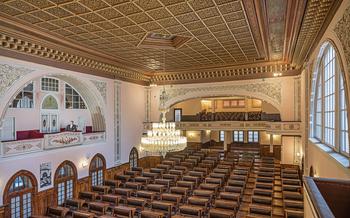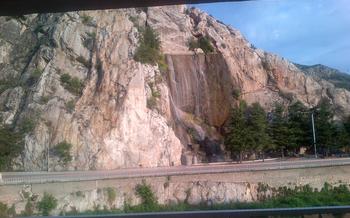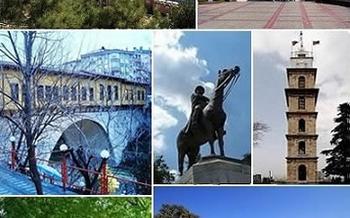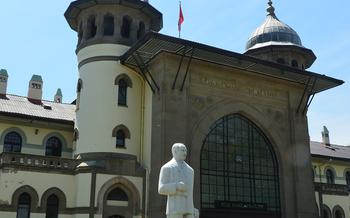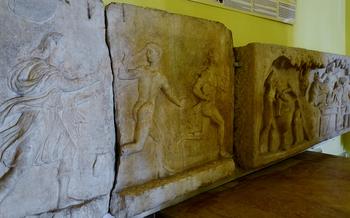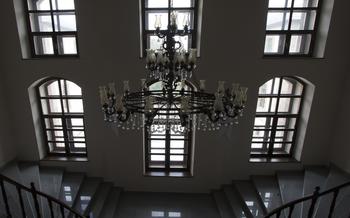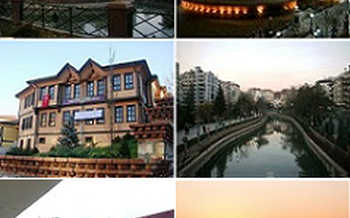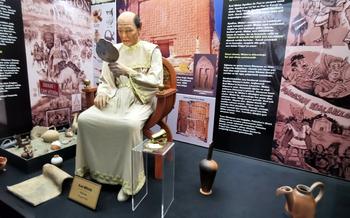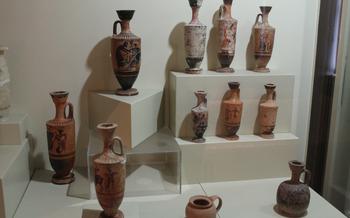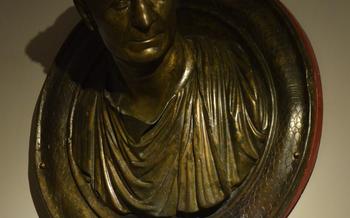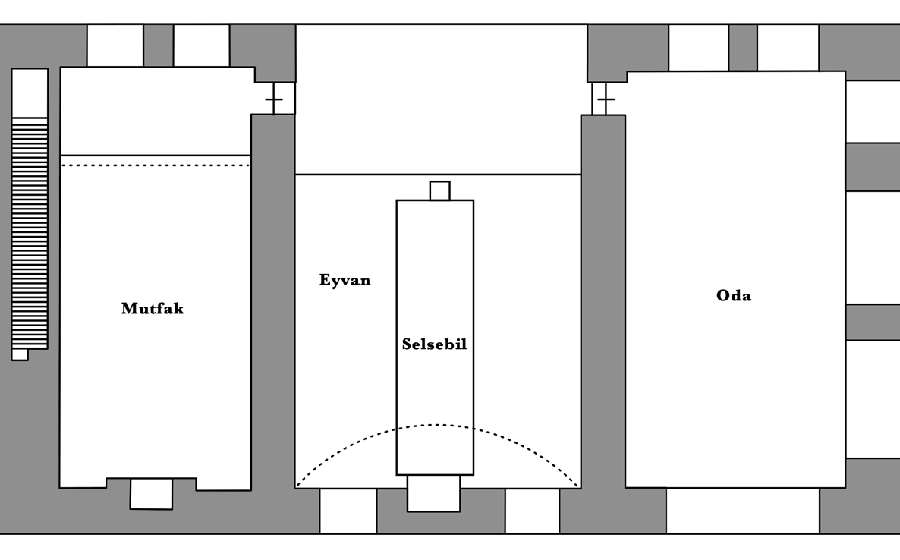
Gazi Köşkü
- Gazi Köşkü: A Historical Gem in Diyarbakır
- Location and Accessibility
- Historical Context
- Architectural Highlights
- Exhibitions and Displays
- Cultural Significance
- Guided Tours
- Photography and Videography
- Souvenirs and Gifts
- Accessibility for Visitors with Disabilities
- Nearby Attractions
- Local Cuisine and Dining Options
- Accommodation Options
- Events and Festivals
- Insider Tip: Unveiling a Hidden Treasure
Gazi Köşkü: A Historical Gem in Diyarbakır
Gazi Köşkü stands as a testament to the rich history of Diyarbakır and its significance during the Ottoman Empire. Constructed in the early 20th century, this magnificent mansion served as the residence of Mustafa Kemal Atatürk, the revered founder of the Republic of Turkey, during his visits to the city. Today, it stands as a museum, inviting visitors to delve into the life and legacy of this extraordinary leader.
The architectural splendor of Gazi Köşkü reflects the grandeur of the Ottoman era. Its impressive façade, adorned with intricate carvings and delicate embellishments, hints at the opulence that awaits within. The mansion's interior is equally captivating, boasting spacious rooms, high ceilings, and elegant decorations that evoke a sense of grandeur and historical significance.
Beyond its architectural beauty, Gazi Köşkü houses a wealth of exhibitions that showcase artifacts, documents, and personal belongings of Mustafa Kemal Atatürk. These exhibits offer visitors a glimpse into the life and work of this visionary leader, shedding light on his role in the Turkish War of Independence and his enduring legacy as the father of modern Turkey.
Gazi Köşkü is not merely a museum; it is a symbol of Turkish independence and a testament to Atatürk's unwavering commitment to his nation. Its cultural significance lies in its representation of a pivotal moment in Turkish history, when the country fought for its freedom and emerged as a sovereign state.
Location and Accessibility
Gazi Köşkü is situated in the heart of Diyarbakır, on Cumhuriyet Caddesi, in the Yenişehir district. Reaching the mansion is a breeze, whether you opt for public transportation or prefer the convenience of your own vehicle.
By Public Transportation: Hop on any of the buses that ply the Cumhuriyet Caddesi route, and you'll find yourself right at the doorstep of Gazi Köşkü. The mansion is also within walking distance from the city center, offering a pleasant stroll through Diyarbakır's vibrant streets.
By Private Vehicle: If you're driving, follow the signs to the city center and look for Cumhuriyet Caddesi. Gazi Köşkü will be on your right, just a short distance from the main road. Ample parking is available nearby, ensuring a hassle-free visit.
Opening Hours: Gazi Köşkü welcomes visitors from Tuesday to Sunday, between 8:30 AM and 4:30 PM. Keep in mind that the mansion is closed on Mondays, so plan your visit accordingly.
Admission Fees: Admission to Gazi Köşkü is free of charge, allowing everyone to explore this historical gem without any financial barriers. Embrace the opportunity to delve into Turkey's rich past without spending a dime.
Historical Context
Ottoman Empire
Diyarbakır and its surrounding region played a significant role during the Ottoman period. The city served as a strategic military base due to its geographical location, connecting Anatolia with the Middle East. It was also a major center of trade and commerce, with caravans transporting goods along the Silk Road. The Ottoman Empire's influence can still be seen in the city's architecture, with many mosques, madrasahs, and caravanserais dating back to this era.
Mustafa Kemal Atatürk
Mustafa Kemal Atatürk, the founder of the Turkish Republic, is a revered figure in Turkish history. Born in Thessaloniki, he rose through the ranks of the Ottoman military and became a prominent leader during the Turkish War of Independence. Atatürk's vision for a modern, secular Turkey led to the establishment of the Turkish Republic in 1923, and he served as its first president until his death in 193
Turkish War of Independence
The Turkish War of Independence was a pivotal moment in Turkish history. Following the collapse of the Ottoman Empire, Turkish forces, led by Mustafa Kemal Atatürk, fought against the Allied powers and the Armenian forces to secure Turkey's independence. The war ended with the signing of the Treaty of Lausanne in 1923, which recognized Turkey's sovereignty and established its borders.
Architectural Highlights
Exterior Design
Gazi Köşkü stands out with its striking exterior design, reflecting the architectural style of the early 20th century. The grand entrance, adorned with intricate carvings and decorative elements, invites visitors into the mansion. The façade is a testament to the skilled craftsmanship of the period, showcasing a harmonious blend of traditional Turkish and European influences. The building's exterior features elegant balconies, arched windows, and a distinctive roofline, contributing to its overall grandeur and visual appeal.
Interior Design
The interior of Gazi Köşkü is meticulously designed to create a sense of spaciousness and elegance. High ceilings, adorned with intricate moldings and chandeliers, add to the mansion's grandeur. The spacious rooms feature parquet flooring, large windows that flood the space with natural light, and decorative fireplaces that add a touch of warmth and charm to the ambiance. Visitors can admire the intricate carvings, decorative plasterwork, and carefully selected furnishings that reflect the refined taste of the period.
Furnishings and Décor
The furnishings and décor of Gazi Köşkü provide a glimpse into the lifestyle and preferences of Mustafa Kemal Atatürk and his contemporaries. The mansion's rooms are adorned with a collection of antique furniture, including ornate chairs, tables, and sofas. Visitors can admire the carefully chosen artwork, carpets, and textiles that reflect the eclectic taste and cultural influences of the period. The mansion's interior design offers a glimpse into the personal style and preferences of Atatürk, showcasing his appreciation for both traditional and modern aesthetics.
Exhibitions and Displays
Gazi Köşkü houses a wealth of exhibitions and displays that offer visitors a glimpse into the life and times of Mustafa Kemal Atatürk, as well as the broader history of Turkey's struggle for independence. Among the highlights are Atatürk's personal belongings, which include his uniforms, medals, and other artifacts that provide a tangible connection to the great leader. Historical documents and photographs exhibited in the mansion shed light on the events of the Turkish War of Independence and Atatürk's role in shaping the course of Turkish history. Interactive displays and multimedia presentations further enhance the visitor experience, providing additional information and context. These exhibitions not only showcase the legacy of Atatürk but also serve as a reminder of the sacrifices made by the Turkish people in their quest for freedom and independence.
Cultural Significance
Symbol of Independence
Gazi Köşkü stands as a potent symbol of Turkey's hard-fought struggle for independence. It was during Atatürk's stay in this very mansion that he orchestrated the final stages of the Turkish War of Independence. The strategic decisions made within these walls played a pivotal role in securing Turkey's freedom from foreign occupation and establishing the modern Turkish Republic. The mansion's enduring presence serves as a constant reminder of Atatürk's unwavering leadership and the sacrifices made by countless individuals in the pursuit of national sovereignty.
National Heritage
Gazi Köşkü holds immense significance as a national heritage site, embodying the rich history and cultural legacy of Turkey. Its preservation and accessibility to the public ensure that future generations can learn about and appreciate the nation's journey towards independence. The mansion's historical significance extends beyond its role in the Turkish War of Independence; it also sheds light on the architectural styles and cultural influences that shaped Diyarbakır and the surrounding region throughout the centuries.
Symbol of Unity
Gazi Köşkü transcends its historical importance to become a symbol of unity and national pride for the Turkish people. It represents the collective efforts and sacrifices made by individuals from all walks of life in the pursuit of a common goal: the establishment of an independent Turkish state. The mansion's enduring legacy serves as a reminder of the strength and resilience of the Turkish nation, fostering a sense of unity and patriotism among its citizens.
Guided Tours
Availability and Cost
Guided tours of Gazi Köşkü are available in various languages, including English, Turkish, and Arabic, to cater to international visitors. The frequency of these tours varies throughout the day, typically offered several times in the morning and afternoon. Guided tours are subject to a fee, which may be included in the entrance ticket or charged separately. Visitors are advised to inquire about the tour schedule and costs at the ticket counter upon arrival.
Benefits of Taking a Guided Tour
Taking a guided tour of Gazi Köşkü offers numerous benefits, particularly for those seeking a deeper understanding of the mansion's history and significance. Knowledgeable guides provide insightful commentary and anecdotes that bring the exhibits to life, shedding light on the life of Mustafa Kemal Atatürk, the events of the Turkish War of Independence, and the cultural importance of Gazi Köşkü. Guided tours allow visitors to ask questions, engage in discussions, and gain a more comprehensive perspective on the mansion and its place in Turkish history.
Photography and Videography
Gazi Köşkü allows visitors to capture their memories through photographs and videos, creating a lasting record of their visit to this historic mansion. While photography and videography are generally permitted, it is important to respect the rules and regulations of the museum. Flash photography is not allowed, as it can damage the delicate artifacts and exhibits. Additionally, visitors should be mindful of other guests and avoid obstructing their views or disturbing the peaceful atmosphere of the mansion. By following these guidelines, visitors can ensure that they capture their memories while respecting the heritage and significance of Gazi Köşkü.
Souvenirs and Gifts
Gazi Köşkü offers visitors the opportunity to take home a piece of history and culture by visiting its gift shop. Here, you can find a variety of souvenirs and mementos that are either specifically related to the mansion or reflect Turkish history and culture in general. Whether you're looking for a unique gift for a loved one or a special keepsake for yourself, the Gazi Köşkü gift shop has something for everyone.
Some of the most popular souvenirs include replicas of artifacts and documents related to Atatürk and the Turkish War of Independence. Visitors can also find a selection of books, postcards, and other publications that provide further insights into the history of the mansion and the surrounding region.
For those seeking more unique and artisanal items, the gift shop also offers a range of handmade crafts and souvenirs created by local artisans. These items are often inspired by traditional Turkish motifs and techniques, making them a great way to support local talent and take home a truly authentic memento of your visit to Gazi Köşkü and Diyarbakır.
Be sure to allocate some time during your visit to browse the gift shop and find the perfect souvenir to commemorate your experience. Whether you choose a replica of a historical artifact, a piece of handmade jewelry, or simply a postcard with a stunning view of the mansion, your souvenir from Gazi Köşkü will serve as a lasting reminder of your time in this historic and culturally significant place.
Accessibility for Visitors with Disabilities
Gazi Köşkü is committed to ensuring accessibility for visitors with disabilities. The mansion features ramps and elevators to facilitate movement throughout the building, allowing wheelchair users to explore the exhibitions and learn about the history of the mansion and Mustafa Kemal Atatürk. Additionally, designated staff or assistance is available to help visitors with disabilities navigate the mansion and its exhibitions, providing support and ensuring a comfortable and inclusive experience for all visitors.
Nearby Attractions
In addition to Gazi Köşkü, Diyarbakır offers a wealth of other historical and cultural attractions that visitors can explore. Just a short distance away, history enthusiasts can delve into the past at Suruç Castle, a magnificent fortress that has stood guard over the city for centuries. With its towering walls and panoramic views, the castle offers a glimpse into the region's rich and tumultuous history.
For those seeking spiritual enlightenment, a visit to the Great Mosque of Diyarbakır is a must. This architectural masterpiece, with its intricate stonework and soaring minarets, is one of the oldest and most revered mosques in Turkey. Visitors can marvel at its stunning interior, adorned with colorful tiles and delicate calligraphy, and immerse themselves in the tranquility of this sacred space.
Finally, no trip to Diyarbakır is complete without exploring the Diyarbakır Fortress, a UNESCO World Heritage Site that encircles the city like a protective embrace. With its imposing walls, monumental gates, and hidden chambers, the fortress offers a fascinating journey through time, revealing the city's resilience and enduring spirit.
Local Cuisine and Dining Options
Diyarbakır offers a tantalizing array of local delicacies that will delight the taste buds of visitors. A must-try is the renowned "mırra," a bitter coffee that holds a special place in the city's culinary heritage. Its unique flavor and aroma have made it a beloved beverage among locals and visitors alike.
For a culinary adventure, indulge in "çiğköfte," a spicy raw meat dish that is sure to tantalize your palate. This delectable dish, made from finely minced meat, bulgur, and a blend of spices, is a true testament to the culinary prowess of Diyarbakır.
To experience the authentic flavors of Turkish cuisine, venture into the charming local restaurants or eateries near Gazi Köşkü. These culinary havens offer a warm and inviting atmosphere, allowing you to savor the essence of Diyarbakır's rich culinary traditions.
From street vendors serving mouthwatering kebabs to traditional restaurants showcasing regional specialties, Diyarbakır is a gastronome's paradise. Don't miss the opportunity to embark on a culinary journey that will leave you with lasting memories of this vibrant city.
Accommodation Options
When planning your visit to Diyarbakır, finding comfortable and convenient accommodation near Gazi Köşkü is essential. Several hotels and guesthouses in the vicinity offer a range of options to suit different budgets and preferences.
For a luxurious stay, consider the Diyarbakır Divan Hotel, located just a short walk from Gazi Köşkü. This five-star hotel offers elegant rooms and suites, a spa, a fitness center, and several dining options.
If you prefer a more intimate atmosphere, the Gazi Konağı Hotel is a charming boutique hotel housed in a historic mansion. It features beautifully decorated rooms, a cozy lounge, and a rooftop terrace with panoramic city views.
For budget-conscious travelers, the Diyarbakır Backpackers Hostel offers affordable dorm rooms and private rooms. The hostel has a friendly and social atmosphere and organizes regular events and activities for guests.
To secure the best deals on accommodation, book your stay in advance, especially during peak tourist seasons. Online booking platforms and travel agents often offer discounts and special promotions.
Remember to check guest reviews and ratings to ensure you choose a place that meets your needs and expectations.
Events and Festivals
Diyarbakır is a vibrant city that hosts various festivals and events throughout the year, providing visitors with a chance to immerse themselves in the local culture. One of the most significant events is the annual Atatürk Commemoration Day, held on November 10, which marks the anniversary of Mustafa Kemal Atatürk's death. During this special day, Diyarbakır pays tribute to the founder of the Turkish Republic with solemn ceremonies, parades, and cultural performances. Visitors can witness the city's deep respect and admiration for Atatürk and gain a deeper understanding of his legacy.
Insider Tip: Unveiling a Hidden Treasure
Beyond the main exhibitions and attractions, Gazi Köşkü holds a hidden gem that often goes unnoticed by visitors. Tucked away in a secluded corner of the mansion's garden, a small, unassuming door leads to a secret room. This hidden chamber once served as Atatürk's private study, where he spent countless hours contemplating, planning, and making decisions that shaped the course of Turkish history.
Today, this hidden room has been transformed into a small museum, showcasing personal artifacts and documents that provide a glimpse into Atatürk's life and work. Visitors can marvel at his handwritten notes, maps, and photographs, offering a rare and intimate perspective on the man who led Turkey to independence.
To access this hidden treasure, simply ask a museum attendant for directions to Atatürk's study. They will gladly guide you to this secret chamber, where you can step back in time and experience a moment of history.
